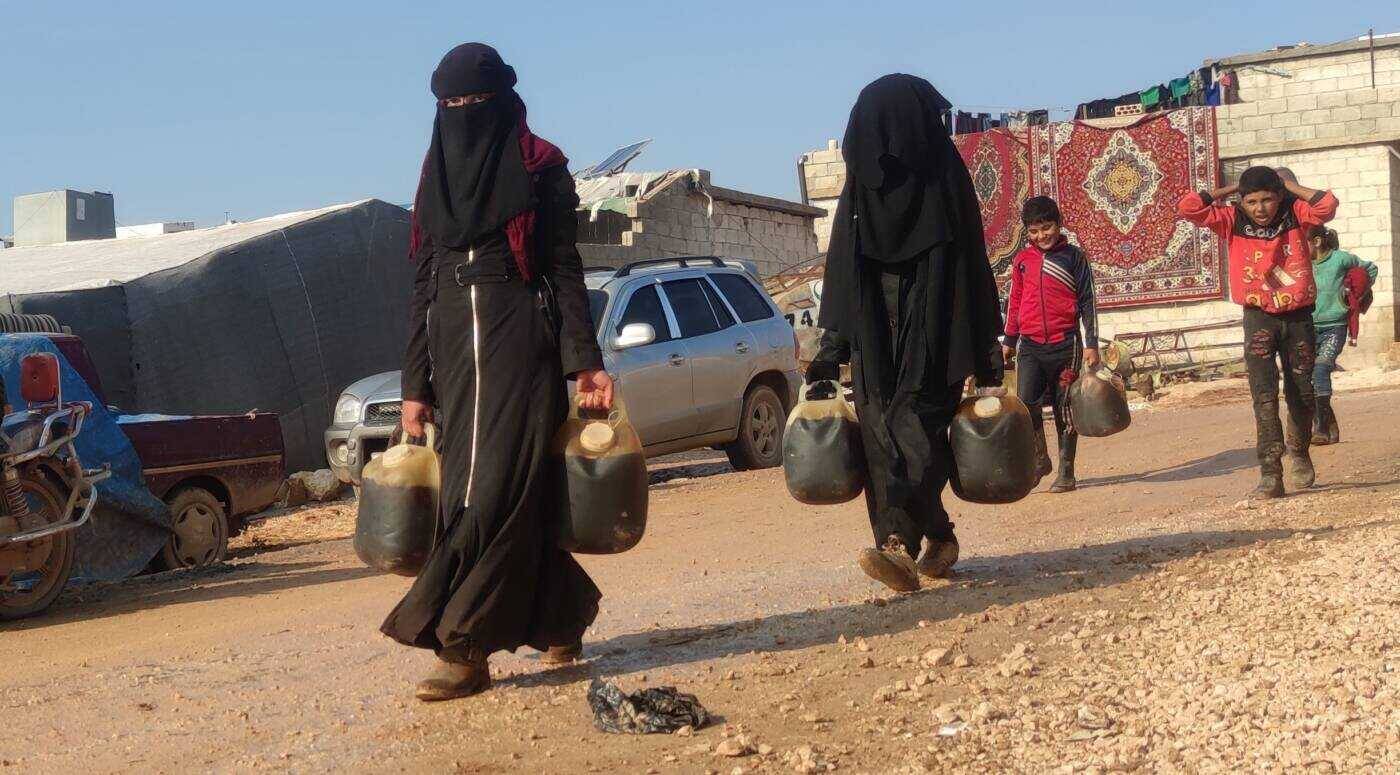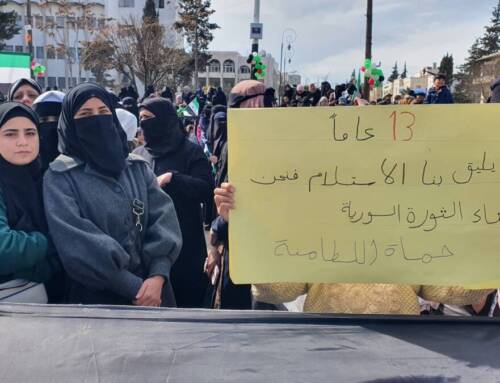Between hardship and exploitation: Fuel smuggling a livelihood for northwestern Syria’s women and children
Increased demand for fuel makes winter a key season for women and children smugglers, but working in this weather is more difficult because of the muddy roads they traverse.
27 January 2022
IDLIB — Hoping to achieve her dream of buying an electric washing machine to alleviate her eczema symptoms, Wadha al-Obeid, 28, works smuggling mazot diesel fuel from Turkey-backed opposition Syrian National Army (SNA)-controlled areas in the northern Aleppo countryside to Hay’at Tahrir al-Sham-controlled territory in Idlib province.
Since November 2021, al-Obeid has been part of an active diesel smuggling trade that is the result of the difference in fuel prices between the two northwestern Syrian regions. A liter of diesel in SNA-controlled areas costs 6 Turkish lira ($0.44 according to the current exchange rate), while a liter of refined diesel goes for 10.5 lira ($0.78) at fuel stations owned by the Watad company, which has a monopoly on diesel distribution in HTS areas.
Al-Obeid has lived in the Atma camps on the Syrian-Turkish border since she was displaced from the town of Sinjar in the eastern Idlib countryside in early 2019. But despite the hardships of the camps, it is poverty and the lack of other available livelihoods that has driven her and women like her, as well as children, to work in smuggling in recent months.
Poverty rates in northwestern Syria are at “record levels of more than 90 percent,” according to figures issued by the Syrian Response Coordination Group, an Idlib-based humanitarian organization, last November.
By transporting 75 liters of diesel a day between northern Aleppo and Idlib, al-Obeidi earns between 75 and 90 lira ($5.50-670), she told Syria Direct.
Displaced men in the Atma camps are also involved in diesel smuggling, but their role is limited to selling the fuel transported by women and children, said Harbi Abdelaziz, 25, who sells the diesel his wife smuggles from SNA areas.
HTS policy in dealing with smugglers promotes the entry of women and children into the smuggling market, as the group’s forces “go easy on women and children, in contrast to deterring men,” said Mohsen al-Naif. The 20-year-old smuggler told Syria Direct he was detained in the HTS-run al-Maasara prison in northern Idlib’s Qah area for seven days after being caught last October. HTS also “confiscated 25 liters of diesel I was trying to smuggle from Deir Balout, in the western Afrin countryside, to the Atma area,” he said.
Victims of exploitation
Increased demand for fuel makes winter a key season for women and children smugglers, but working in this weather is more difficult because of the muddy roads they traverse. Smugglers must also cross a trench separating the northern Aleppo countryside from Idlib, all for a few dollars at the end of the day.
But in addition to harsh working conditions, the women and children who do this work face exploitation by fuel traders, as happened to Warda al-Abdullah. In December, she delivered 20 liters of smuggled diesel to a trader in the Atma area for 7.75 lira ($0.58) per liter. But after returning home “and reviewing the accounts with my husband, it became clear that the trader calculated the price per liter at 7.4 Turkish lira [$0.55], taking advantage of my lack of knowledge of the calculations,” she told Syria Direct.
Hassan al-Khatib, 12, bought 20 liters of locally processed diesel in December from the al-Hamra station in Deir Balout, in the Afrin area of northern Aleppo. But after reaching Atma camp and selling the fuel while measuring by hand, it became clear that “the quantity was only 18.5 liters,” he told Syria Direct. “I lost 11 lira [$0.82] in profit.”
On top of that, the fluctuation of the Turkish lira against the dollar increases opportunities for fuel traders to exploit smugglers. “The buying price varies from one trader to another,” said al-Obeid, and often “we sell what we smuggle at prices below the actual price.” She emphasized that “children especially are not familiar enough with trade and exchange rates, so they are often taken advantage of.”
For his part, one trader, Mustafa (a pseudonym) confirmed that profit rules the process of marketing all kinds of smuggled materials. “The purchase price from the smugglers is not fixed, and varies between men, women, and children,” he told Syria Direct. “The price is adopted after bargaining and negotiating with the smuggler.”
Mustafa acknowledged that traders like him profit most out of those who participate in smuggling, since they also control the price of illicit diesel in Idlib’s markets, underselling the Watad company to ensure demand. If the price of a liter of diesel sells for 10.5 lira ($0.78) at Watad stations, smuggled diesel is offered to the consumer for 9.5 lira ($0.70).
Dealing with smuggling cases
There are no clear laws governing smuggling in the areas of influence of the HTS-backed Salvation government. “The ruling is left to the judge’s discretion, giving him the authority to determine the punishment by imposing monetary fines or destroying the smuggled material,” according to lawyer Alaa al-Batal, a member of the Free Idlib Bar Association. “The punishment varies according to the type of contraband,” he told Syria Direct.
In the case of diesel smuggling, if it is seized with the smugglers, “it is just destroyed,” according to lawyer al-Batal. But if it is seized in possession of the trader, “the contraband is confiscated, and the trader is fined $300 the first time.”
For other items, such as cigarettes, if a smuggler is caught red-handed, the individual “is fined $100 the first time, and if it is repeated, the fine is triple, with a penalty of one month imprisonment,” according to al-Batal.

A young girl stands with a group of smugglers waiting to be paid for diesel she smuggled to the Atma area, 12/17/2021 (Syria Direct)
It has been customary to be lenient with women and children smugglers, the lawyer said, with the only penalty imposed being the destruction of the diesel. This “does not apply to other substances, such as drugs, for which the penalty for those involved reaches a fine of $10,000 and lengthy imprisonment,” he added.
Because measures taken by HTS and the Salvation Government to curb fuel smuggling have not succeeded in preventing it, Watad has intervened. As the sole company officially authorized to sell diesel by the Salvation Government, it is the main party affected by fuel smuggling operations. “Watad employees are present at the Deir Balout checkpoint to measure the amount of diesel in the tanks of vehicles crossing and to prevent smuggling,” a source who crosses through the checkpoint weekly told Syria Direct, asking not to be identified.
But Syrian lawyer Abdulnasser Houshan, who lives in Turkey, said the transfer of goods and products from the northern Aleppo countryside to Idlib province “cannot be legally described as smuggling, given that those transporting the goods are Syrian citizens who have the right to move freely and practice trade anywhere in the country.”
He added to Syria Direct that “therefore, [smugglers] cannot be convicted of the crime of smuggling, unless their trade is accompanied by prohibited items, such as weapons, drugs, and counterfeit currency.”
Safeguarding the rights of women and children
International conventions and treaties, including the 1989 Convention on the Rights of the Child, prohibit child labor. National laws, including Syrian family law and Labor Law No. 17 of 2010 stipulate that “women have the right to work like men, but prevent or prohibit the exploitation of women and children in jobs that are not appropriate for their nature or age,” said lawyer Houshan.
But despite the risks and exploitation faced by women and children who work as smugglers in northwestern Syria, “they do not report their conditions as a violation, because they consider it a form of work that protects them from poverty and hunger,” said Fadel Abdul Ghani, director of the Syrian Network for Human Rights (SNHR).
“The exploitation of children and women in smuggling is one of the worst forms of employment, as it is dangerous work,” warned Abdul Ghani, adding that responsibility “lies with the opposition factions, because they have not found suitable solutions to avoid this phenomenon.”
The dangers and insecurity of smuggling as a livelihood are embodied in the situation of Noufa al-Omar (a pseudonym), 37. After crossing a distance of four kilometers while smuggling 20 liters of diesel and some packs of cigarettes last November, al-Omar fell in a ditch and broke her right arm, she told Syria Direct.
Apart from al-Omar’s financial loss during the incident, as “the diesel spilled into the ditch,” today she is unable to work at all.
This report was originally published in Arabic and translated into English by Mateo Nelson.







